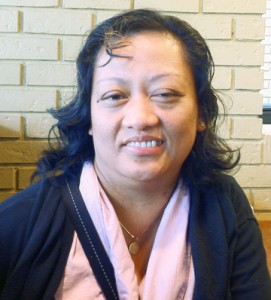Nursing: a career for the compassionate
Name: Emelita Alagadan
Occupation: Registered nurse
Employer: Peace Arch Hospital
Union: BCNU
Emelita Alagadan is an RN who now works at Peace Arch Hospital after more than a decade of service at Riverview Hospital. The closure of Riverview this summer after 100 years of treating people with mental illness, is poignant for many of the staff, patients and their families.
“As staff, even though we heard for a long time that they were going to close Riverview, we didn’t really believe it was going to happen. Most people thought a solution would be reached or an alternative plan would be created to keep Riverview open,” remembers Emelita.
Her union, the BC Nurses’ Union, was there to support its members throughout the process of closing the facility, ensuring that patients and nurses weren’t left to fall between the cracks. “The staff at BCNU is very helpful. Any problems or questions you have, they are always there. The union is there to stand up for you. Going to BCNU meetings is a very good learning experience, and the staff are there to help and answer all your questions,” she explains.
Emelita studied nursing in the Phillipines and after arriving in Canada, she took less than a year to successfully pass the certification course to work as a nurse. “I chose nursing because I wanted to work with people, and nursing is such an important service,” says Emelita.
“Nursing as a career is very rewarding. In the medical wards where I first practiced nursing, patients come and go pretty fast. There, you help your patients feel better, you get them moving again, and then you send them home happily to their family. Psychiatric nursing is different, it’s long-term. Unlike medical patients, it is not always the case that they are going to get better. In fact, in psychiatric nursing, when we care for the elderly, we understand that our patients will deteriorate while in our care due to the progressive declines that accompany some diagnoses. One of our roles becomes helping patients and their families cope with that.”
Speaking about patients moved from Riverview she says “the change in environment meant that it has taken them a long time to settle. Moving is already a difficult exercise for healthy people like us, so imagine how much more so for the mentally challenged. It’s very sad.”
As she looks back on her time at Riverview, Emelita recalls “at first I was scared to try psychiatric nursing. I was used to being a nurse that worked on the medical floor or the operating room with acute patients. Once I became a nurse in Canada, I applied everywhere. When Riverview was the first to call, I accepted right away. I wanted to pay off my student loan. I stayed because of the great people I worked with and realized it’s no different than working anywhere. Nursing is still nursing.”
Thankfully Emelita’s position at her new workplace saw many of her former patients and co-workers reunited, easing the transition for both patients and those who care for them.
